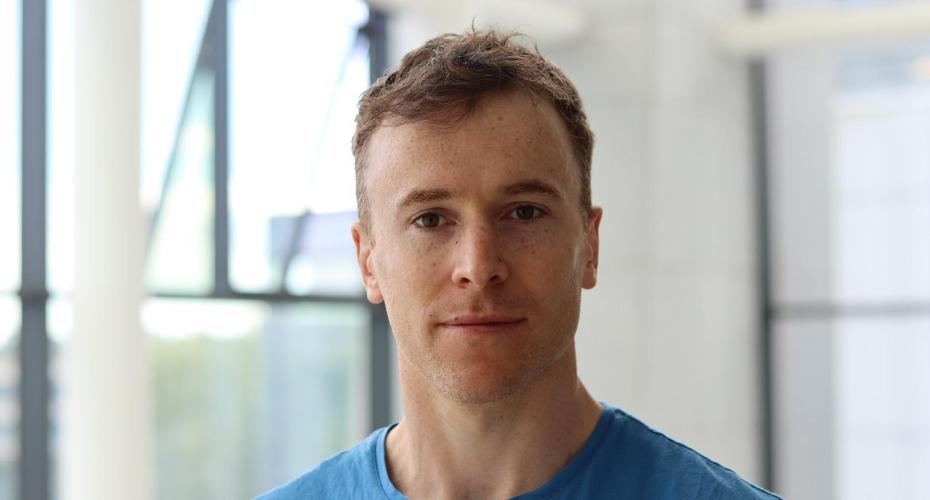Smartwatch health data a “massive opportunity” for researchers
Friday, 28 July, 2023
Listen to the(opens in a new window)podcast

Dr. Cailbhe Doherty is Assistant Professor and Ad Astra Fellow at the School of Public Health, Physiotherapy and Sports Science at University College Dublin. His project, ‘Cerberus - acting as a watchdog for consumers of wearable devices for health and fitness’, was awarded funding earlier this year as part of the Science Foundation Ireland National Challenge Fund - Future Digital Challenge.
When he recently crashed his bicycle, Dr Cailbhe Doherty’s smartwatch knew he was in trouble immediately.
“There is a ‘falls detection’ feature on the Apple Watch. If you have a fall the accelerometer and the gyroscope data within the watch will prompt the alert: ‘Do you need me to call emergency services?’ That is potentially very powerful.”
His watch asked “exactly that” question after his cycling accident - but, happily, Dr Doherty was unhurt.
This is just one way in which smartwatches might potentially help to safeguard our wellbeing. Another is by tracking our biometric data over time - such as heart rate, body temperature and sleep - to potentially predict any deterioration in our health.
“Let's say you wear your device 24 hours a day. Your sleep patterns, your physical activity patterns, your resting heart rate, the deviations in your body temperature, your respiratory rate, all of that data can be combined to make a sort of a biometric fingerprint of you,”
He adds that wearable devices have already been used to detect atrial fibrillation, Lyme disease and the onset of COVID-19.
A survey of 1000 Irish people conducted as part of Dr Doherty’s Cerberus project found that an astonishing 65% of respondents wore a smartwatch, like an Apple Watch, Fitbit or Garmin.
“The issue is that right now, all the data has been siloed away into these companies’ servers and ecosystems and it’s very hard to gain access to it. So how do you put the control of the data back into the hands of the users and potentially into the hands of the research community? That’s where Cerberus comes in.”
Cerberus is a citizen science project that plans to create a public databank for smartwatch users to donate their biometric data, empowering individuals and unlocking wearable devices’ potential for disease-detection and health monitoring.
“Ultimately, what we would like is for the project to become a hub where people can donate their wearable device data and for researchers around the world to apply to use that data to glean insights about those biometric fingerprints.”
He gives the example of the UK’s Biobank, which has genetic and health information from half a million participants and counting.
“Researchers apply for that data and they conduct analyses on it. And it may be the case that 90% of the analyses that are done don't come to anything. But when you have a dataset that large and a global community of researchers looking at it and evaluating it, they can glean insights into the genetics of a given disease, or how a drug intervention differs between different people and how that might affect their outcome for that disease. That is the way that improvements in healthcare are going to be made. Having datasets like that is the foundation upon which personalised medicine will be achieved.”
The Cerberus project is not just about donating data, but about figuring out how to collect and manage it.
“It’s surprisingly difficult to centralise and standardise the data that comes from an Apple Watch with that from a Garmin, with that from a Fitbit. Storing and organising and labelling all that data is probably the core challenge of our project.”
A motivating factor is the potential of such a database to improve Irish healthcare in the future.
“If you’re wearing that device every day, then in 10 or 20 or 30 years the data that is being stored by that device could be really, really powerful. Not just for you, but also for the public.”
He describes the “dystopian” and “utopian” possibilities of access to biometric data, from medical insurers potentially using deteriorating health to increase people’s premiums, to predicting and intervening in a health crisis before it arises.
“In Europe, we are at an advantage because of the General Data Protection Regulation (GDPR), which essentially means that you own your data, you have the right to be forgotten, and that is the way it should be.”
The Cerberus survey found that 85% of respondents said they were either “very comfortable” or “comfortable” with sharing their smartwatch data for research purposes.
“We're trying to build a data donation platform where researchers can apply to use that data. Once they have ethical approval, the data will be anonymised. And users, obviously, would be consenting to donate their data.”
He mentions similar smartwatch data projects in the US and Canada, which also seek to understand, improve and futureproof healthcare for the wider population.
“From our perspective, this problem will be solved. It might not be by us, but it will be by someone.”
Cerberus was born out of the Insight Centre for Data Analytics in UCD, where it is one of several projects related to wearables. Dr Doherty encourages anyone who would like to participate in the Cerberus project to log onto(opens in a new window)www.wearablewatchdog.com.
Listen to the (opens in a new window)podcast